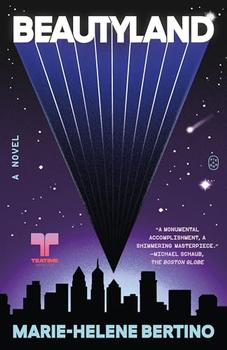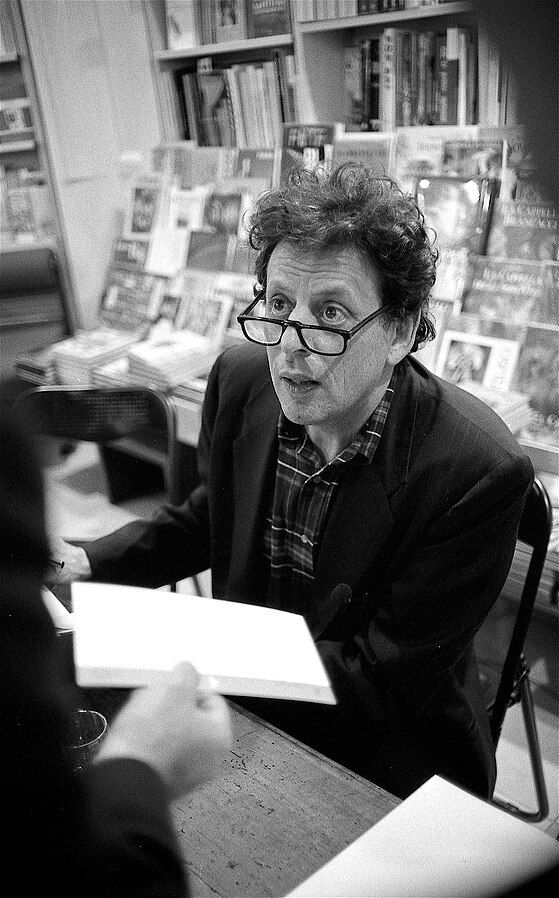Summary | Excerpt | Reading Guide | Reviews | Beyond the Book | Read-Alikes | Genres & Themes | Author Bio

A Novel
by Marie-Helene BertinoThis article relates to Beautyland
 In Marie-Helene Bertino's Beautyland, the protagonist, Adina, has a visceral reaction to a song that plays at the end of a movie she sees at the planetarium. "At the end of the film, they pan through the universe. A song begins. Made out of choppy, repetitive phrases, sturdy in the middle and fragile around the edges, so soothing she can't believe a human has made it," Bertino writes. Adina asks who the artist is and a classmate "gives her one of the most important details of her life: 'It's Philip Glass.'"
In Marie-Helene Bertino's Beautyland, the protagonist, Adina, has a visceral reaction to a song that plays at the end of a movie she sees at the planetarium. "At the end of the film, they pan through the universe. A song begins. Made out of choppy, repetitive phrases, sturdy in the middle and fragile around the edges, so soothing she can't believe a human has made it," Bertino writes. Adina asks who the artist is and a classmate "gives her one of the most important details of her life: 'It's Philip Glass.'"
Born in 1937, Glass is an American composer known for his solo work, film scores, operas, and collaborations. He's well known for bridging classical music with popular music, thanks in part to his collaborations with a wide array of other artists, including Ravi Shankar, Leonard Cohen, and David Bowie. He's considered one of the pioneers of minimalism, a genre identified by the "choppy, repetitive phrases" Adina hears.
Adina especially loves his album Glassworks, which was released in 1982. Glass made the record attempting to appeal to both contemporary classical and pop music fans. Classical audiences interpreted this goal as pandering to the masses. To their point, it remains Glass's bestselling album. It helped make him such a household name that he was lampooned on the Comedy Central cartoon South Park. In the episode, the animated version of Glass plays one note over and over again. However, Glassworks has also maintained street cred through the artists it's influenced along the way. Contemporary ambient and electronic artists like Aphex Twin, Portishead, and Brian Eno cite the record as a major influence.
Many listeners still discount Glassworks because it's so different from Glass's other work. The New York Times referred to it as a "footnote in Glass's catalog." It's not wholly unfair to point out the stylistic differences. Glass was only the second composer signed to the major CBS Records label—the first being Aaron Copland—and his critics accused him of selling out. It didn't help that Glassworks was vastly different from Einstein on the Beach, a popular opera Glass released the previous year. Unlike his operas and film scores (which include the Oscar-nominated score for The Hours), Glassworks was never meant to tell a story. While there was a special mix made for the Walkman, Glass explains in his memoir Music that it "was no gimmick but a truly different mix made with headphones plugged directly into the mixing board."
While reading the different arguments for and against Glassworks is fascinating, there is no substitute for listening to the album itself. I can't imagine anyone hearing the first song, "Opening," and not being moved by the fragility of the solo piano refrains. The song is Chopin-tinged and rainy, hypnotic in its repetitions. I'm always surprised when it turns into the French horn-and-synth-heavy splendor of "Floe." The string arrangements on "Islands" have an apprehensive quality which gradually evolves into wonder as new layers of sound are added. The two final tracks, "Facades" and "Closing," are simply stunning works for strings and piano, nostalgic through and through. I never feel like Glassworks is a cheap appeal to middlebrow tastes. Rather, it's music that anyone might like, with or without a Walkman.
Filed under Music and the Arts
![]() This "beyond the book article" relates to Beautyland. It originally ran in January 2024 and has been updated for the
January 2025 paperback edition.
Go to magazine.
This "beyond the book article" relates to Beautyland. It originally ran in January 2024 and has been updated for the
January 2025 paperback edition.
Go to magazine.
Your guide toexceptional books
BookBrowse seeks out and recommends the best in contemporary fiction and nonfiction—books that not only engage and entertain but also deepen our understanding of ourselves and the world around us.